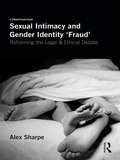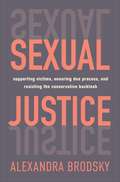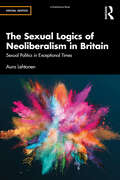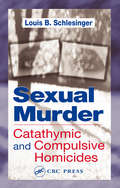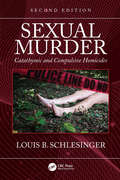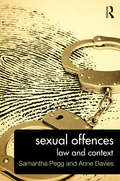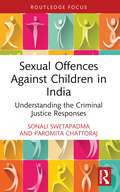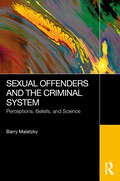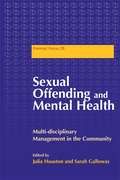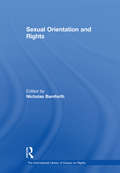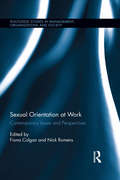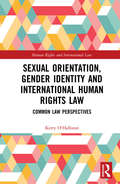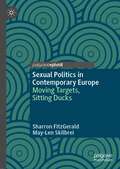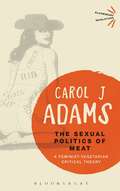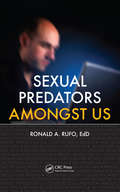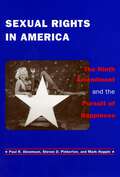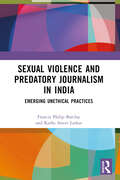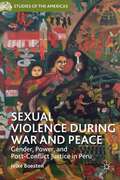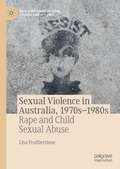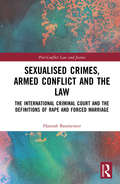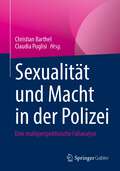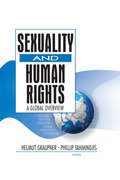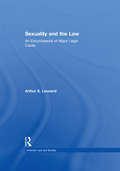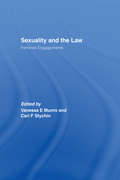- Table View
- List View
Sexual Intimacy and Gender Identity 'Fraud': Reframing the Legal and Ethical Debate
by Alex SharpeThis book is a legal and political intervention into a contemporary debate concerning the appropriateness of sexual offence prosecutions brought against young gender non-conforming people for so-called ‘gender identity fraud'. It comes down squarely against prosecution. To that end, it offers a series of principled objections based both on liberal principles, and arguments derived from queer and feminist theories. Thus prosecution will be challenged as criminal law overreach and as a spectacular example of legal inconsistency, but also as indicative of a failure to grasp the complexity of sexual desire and its disavowal. In particular, the book will think through the concepts of consent, harm and deception and their legal application to these specific forms of intimacy. In doing so, it will reveal how cisnormativity frames the legal interpretation of each and how this serves to preclude more marginal perspectives. Beyond law, the book takes up the ethical challenge of the non-disclosure of gender history. Rather than dwelling on this omission, it argues that we ought to focus on a cisgender demand to know as the proper object of ethical inquiry. Finally, and as an act of legal and ethical re-imagination, the book offers a queer counter-judgment to R v McNally, the only case involving a gender non-conforming defendant, so far, to have come before the Court of Appeal.
Sexual Justice: Supporting Victims, Ensuring Due Process, and Resisting the Conservative Backlash
by Alexandra BrodskyA pathbreaking work for the next stage of the #MeToo movement, showing how we can address sexual harms with fairness to both victims and the accused, and exposing the sexism that shapes today's contentious debates about due processOver the past few years, a remarkable number of sexual harassment victims have come forward with their stories, demanding consequences for their assailants and broad societal change. Each prominent allegation, however, has also set off a wave of questions – some posed in good faith, some distinctly not – about the rights of the accused. The national conversation has grown polarized, inflamed by a public narrative that wrongly presents feminism and fair process as warring interests.Sexual Justice is an intervention, pointing the way to common ground. Drawing on core principles of civil rights law, and the personal experiences of victims and the accused, Alexandra Brodsky details how schools, workplaces, and other institutions can – indeed, must – address sexual harms in ways fair to all. She shows why these allegations cannot be left to police and prosecutors alone, and outlines the key principles of fair proceedings outside the courts. Brodsky explains how contemporary debates continue the long, sexist history of “rape exceptionalism,” in which sexual allegations are treated as uniquely suspect. And she calls on readers to resist the anti-feminist backlash that hijacks the rhetoric of due process to protect male impunity.Vivid and eye-opening, at once intellectually rigorous and profoundly empathetic, Sexual Justice clears up common misunderstandings about sexual harassment, traces the forgotten histories that underlie our current predicament, and illuminates the way to a more just world.
The Sexual Logics of Neoliberalism in Britain: Sexual Politics in Exceptional Times (Social Justice)
by Aura LehtonenThis book explores the relationship between sexuality and politics in Britain’s recent political past, in the decade preceding the Covid-19 pandemic, and asks what sexual meanings and logics are embedded in the dominant political discourses and policies of this time. A discursive framing of ‘exceptionality’ has commonly attached to the politics of austerity, crisis and neoliberalisation that have characterised the 2010s in Britain, with many noting the depoliticising effects of such a crisis politics. The book’s four case studies each investigate a binary concept that has played a key role in these limited and limiting discourses: the stable family/troubled family; deserving/undeserving; public/private and material/cultural. Deploying an expansive notion of sexuality, these binaries are examined by analysing a range of cultural and political texts in which they are reproduced, from policy and legal documents to popular films and TV series. This empirically informed and theoretically innovative analysis makes an important contribution to understandings of sexuality, identity and inequalities, as well as of crisis and neoliberalism. It will be of interest to scholars and students in gender and sexuality studies, cultural studies, sociology, politics and social policy.
Sexual McCarthyism: Clinton, Starr, and the Emerging Constitutional Crisis
by Alan M. DershowitzDiscusses the issues at that time; the clarifications and comments are still of interest.
Sexual Murder: Catathymic and Compulsive Homicides
by Louis B. SchlesingerForensic psychologist and author Louis B. Schlesinger delves deep into the minds of sexual murderers. It is a place where few dare to tread, but a necessary journey if we are to understand the motivations behind their inconceivable actions. Culminating nearly 30 years of experience analyzing sexually motivated homicides, Sexual Murder: Catathymic a
Sexual Murder: Catathymic and Compulsive Homicides
by Louis B. SchlesingerSexual Murder: Catathymic and Compulsive Homicides is the culmination of the author’s 45 years of experience with, and studying, sexually motivated homicide. Sexual murders are generally of two types — catathymic and compulsive. Catathymic homicides are caused by a breakthrough of underlying sexual conflicts. They can be unplanned, explosive (acute) attacks or planned murders stemming from a chronic obsession with, or disturbed attachment to, the victim. In compulsive homicides, a fusion of sex and aggression results in a powerful internal drive which pushes the offender to seek out victims to kill — and the killing itself is sexually gratifying. These murders also may be planned or unplanned. In compulsive homicides that are unplanned, the urge breaks through and disrupts the offender’s controls when a victim of opportunity crosses his path. The compulsive offender who plans his crimes often eludes law enforcement, and as a result he can have multiple (serial) victims over extended periods of time. Both forms of sexual murder — the catathymic and the compulsive — are presented in this volume from a clinical-descriptive perspective encompassing case studies with analysis. Recent advances in empirical research in sexual murder—including findings from the joint research project between John Jay College of Criminal Justice and the FBI Behavioral Analysis Unit in Quantico—has published many important studies. These include such topics as necrophilia, foreign object insertions in sexual homicide, ritual and signature and temporal patterns in serial sexual homicide, mass murder, crime scene staging in homicide, and undoing (symbolic reversal) at homicide scenes. All such research will be included and incorporate into this fully updated Second Edition, including approximately fifty new clinical case studies.
Sexual Offences: Law and Context
by Samantha Pegg Anne DaviesSexual Offences: Law and Context presents the substantive law governing sexual offending in England and Wales in its socio-legal and historical context. It outlines the complexities of the Sexual Offences Act 2003, associated pieces of legislation and the common law offences in a clear, linear narrative. The book highlights and discusses key themes in the contemporary law including rape and consent, sexual offences against children, abuse of people with mental disorders, pornography offences, and prostitution. It offers a critical discussion of challenges for the law and potential ways forward for the future. Designed to be a comprehensive overview, Sexual Offences: Law and Context will be an invaluable resource for students of law and criminology taking courses on sexual offences or pursuing research in this area.
Sexual Offences Against Children in India: Understanding the Criminal Justice Responses (Routledge Frontiers of Criminal Justice)
by Sonali Swetapadma Paromita ChattorajSexual Offences Against Children in India examines the evolution of the law pertaining to sexual violence against children, the judicial decisions since the inception of the POCSO Act till date with respect to aspects of the POCSO Act and the best practices from other developed jurisdictions for handling cases and victims of child abuse.Despite being prevalent, violence against children is often hidden or underreported, though its impact is widely acknowledged. In a country like India the vocabulary to communicate around sexuality and sexual abuse is almost non-existent. India has seen its journey from having no law on sexual abuse of children to having a “special” law in the form of the Protection of Children against Sexual Offences Act 2012 (POCSO Act). This book demystifies the problem of sexual violence against children in India pre- and post-POCSO Act. There is also a novel attempt to examine the implementation of the POCSO Act in the eastern Indian states of Odisha, Jharkhand and West Bengal, and if its objectives were being attained – in content, in implementation, and in impact.This book will be useful for police, judiciary and government officials, scholars, and researchers studying comparative aspects of dealing with sexual offence cases against children.
Sexual Offenders and the Criminal System: Perceptions, Beliefs, and Science
by Barry MaletzkyThis book demonstrates that the criminal justice system in the United States has allowed the natural emotions surrounding sexuality to allow the minority of sexual offenders who are truly dangerous to be merged with the majority of offenders who pose little, if any, risk to be at large. Such aggregations force the system to exhaust resources while ignoring the burgeoning research into the assessment and treatment of such offenders. Relying on research in the literature combined with his many years of experience, Maletzky details how the system operates at present and offers suggestions for change to re-align what we know about sexual offending with how such offenders might be better managed within the criminal justice system. The work provides an overview of the process from the original apprehension of sexual offenders through the determination of their guilt, their detention in prisons or jails, and their supervision following incarceration. Allowing scientific advances to inform decisions in these matters will not only enhance public safety but will spare unnecessary expense, save taxpayers money, and actually serve to prevent future recidivism among such offenders. This work is thought-provoking for attorneys, prosecutors, legal assistants and law clerks, members of the judiciary, those who teach or are students of the administration of justice, those who assess or treat sexual offenders, and offenders and their families affected by the system.
Sexual Offending and Mental Health: Multidisciplinary Management in the Community
by Sarah Galloway Andrew Aboud Julia Houston Alison Beck Jackie CraissatiSexual Offending and Mental Health draws together theoretical, clinical and mental health issues for the range of professionals working in the community and in-patient settings with sex offenders and those who have behaved in sexually inappropriate ways. The contributors describe current influential models of sexual offending and the developmental, psychological and social factors involved. They discuss the prevalence of personality and mental disorders in known sex offenders and the impact these disorders have on their treatment and management. They describe clinical work with individuals, their partners and families, and also consider the impact of this work on professionals. The book includes an outline of current approaches to risk assessment, an overview of the recent changes in legislation in England and Wales, and suggestions for multi-disciplinary management in the community. This book will be essential reading for professionals working in health or criminal justice settings with people who have committed sexual offences or whose sexual behaviour has caused concern for others.
Sexual Orientation and Rights (The International Library of Essays on Rights)
by Nicholas BamforthDebate about the rights of sexual minorities, whether individuals or members of same-sex couples, has become an important issue for legislatures and courts in many constitutional democracies. This volume collects together some of the more significant writings in the debate, and reflects a variety of perspectives: liberal, conservative, and radical. The topics covered include the meaning and importance of sexual freedom, gender roles, marriage and other significant partnerships, child care and adoption, the criminal law, employment, and expression and pornography. The volume also seeks to relate arguments about sexual orientation and rights to broader debates within feminist theory.
Sexual Orientation at Work: Contemporary Issues and Perspectives (Routledge Studies in Management, Organizations and Society)
by Fiona Colgan Nick RumensSexual Orientation at Work: Contemporary Issues and Perspectives brings together contemporary international research on sexual orientation and draws out its implications for lesbian, gay, bisexual, trans and heterosexual employees and managers. It provides new empirical and theoretical insights into sexual orientation employment discrimination and equality work in countries such as South Africa, Turkey, Australia, Austria, Canada, US and the UK. This book is novel in its focus on how sexual orientation intersects with other aspects of difference such as age, class, ethnicity and disability. It adopts new theoretical perspectives (e.g. queer theory) to analyze the rise of new ‘gay-friendly’ organizations, and examines important methodological issues in collecting socio-economic data about sexual minorities. Providing an accessible account of key issues and perspectives on sexual orientation in the workplace, Sexual Orientation at Work caters to a wide range of readers across business, feminist, and LGBT/Queer Studies fields.
Sexual Orientation, Gender Identity and International Human Rights Law: Common Law Perspectives (Human Rights and International Law)
by Kerry O'HalloranThis book identifies, analyses and discusses the nexus of legal issues that have emerged in recent years around sexuality and gender. It audits these against specific human rights requirements and evaluates the outcomes as evidenced in the legislation and caselaw of six leading common law jurisdictions. Beginning with a snapshot of the legal definitions and sanctions associated with the traditional marital family unit, the book examines the subsequently evolving key concepts and constructs before outlining the contemporary international framework of human rights as it relates to matters of sexuality and gender. It proceeds by identifying a set of themes, including the rights to identity, to form a family, to privacy, to equality and to non-discrimination, and undertakes a comparative evaluation of how these and other themes indicate areas of commonality and difference in the approaches adopted in those common law jurisdictions, as illustrated by the associated legislation and caselaw. It then considers why this should be and assesses the implications.
Sexual Politics in Contemporary Europe: Moving Targets, Sitting Ducks
by May-Len Skilbrei Sharron FitzGeraldThe legal regulation of gender and sexuality has undergone dramatic changes throughout Europe in the last 40 years and this has shaped what it means to be a European citizen. Drawing on a range of interdisciplinary research, this book uses the discourses around current European sexual politics as an entry point to interrogate how, and with what effect, the EU and its Member States harness issues of gender and sexuality to support issues of higher political importance. It takes recent and ongoing political debates and legislative changes around prostitution and sexual assault as a focus. Using four national case studies: Poland, Germany, Sweden and Italy it illuminates how the EU’s desire for increased harmonisation across the Union around gender and sexuality norms and values operates differently and with specific effects across Member States. The book’s structure provides a detailed map of how and why contemporary European sexual politics is changing, and how this contributes to establishing European norms and values in developments in law and policy around prostitution and sexual assault. By examining how and why the EU and its Member States implement their policies in these two policy areas we can begin to illuminate how contemporary European sexual politics serve some groups’ interests while marginalizing ‘Others’.
The Sexual Politics of Meat: A Feminist-Vegetarian Critical Theory
by Carol J. AdamsThe Sexual Politics of Meat is Carol Adams' inspiring and controversial exploration of the interplay between contemporary society's ingrained cultural misogyny and its obsession with meat and masculinity. Published in the year of the book's 25th anniversary, the Bloomsbury Revelations edition includes a substantial new afterword, including more than 20 new images and discussions of recent events.
Sexual Predators Amongst Us
by Ronald A. RufoIt is imperative that educators, parents, and potential victims be aware of sexual predators, the danger they pose in our society, and the resources available to help prevent this growing epidemic. Written from a police perspective, Sexual Predators Amongst Us examines the problem of sexual predation, how the Internet has contributed to its growth,
Sexual Rights in America: The Ninth Amendment and the Pursuit of Happiness
by Paul R. Abramson Steven D. Pinkerton Mark HuppinThe Constitution of the United States guarantees all Americans certain rights, such as the freedoms of speech and religious expression. But what guarantees our sexual freedoms? Sexual Rights in America presents a bold and intriguing look at the constitutional basis of sexual rights in America. Resurrecting the "forgotten" Ninth Amendment, which guarantees those fundamental rights not protected elsewhere in the Constitution, Abramson and colleagues argue that the freedom to choose how, when, and with whom we express ourselves sexually is integral to our happiness. Their careful review of the historical record reveals the importance of the "pursuit of happiness" in the socio-moral philosophy underpinning the Constitution. Sexual freedoms, they assert, are cut from the same cloth as the other freedoms protected by the Bill of Rights, and therefore, should be covered by the Ninth Amendment. Using concrete examples such as prostitution and phone sex, Sexual Rights in America illustrates the scope and limitations of Ninth Amendment sexual rights.
Sexual Violence and Predatory Journalism in India: Emerging Unethical Practices
by Francis Philip Barclay Kaifia Ancer LaskarSexual Violence and Predatory Journalism in India examines unethical editorial practices in the reporting of sexual crimes against women in India, introducing the term Predatory Journalism. This book conceptualises and analyses predatory practices that commodify sexual crimes against women, examining how it is facilitated and motivated by online spaces and social media channels and how it can often result in further harm to victims and their families. It argues for editorial intervention, more regulation, policy measures and legal frameworks that will help build a sensitive and ethical media landscape and rebuild public trust. Key issues examined include sexism, sensationalism, invasion of privacy, victim blaming, media trials, media manipulation of information, armchair reporting, explicit sexual imagery, the usage of unreliable sources and a lack of responsibility and accountability. Providing a comprehensive analysis of the issue and offering a framework for ethical practice, Sexual Violence and Predatory Journalism in India will be essential reading for scholars and students of media and cultural studies, journalism and sociology interested in the intersection of media and crime in India and its associated ethical challenges.
Sexual Violence during War and Peace
by Jelke BoestenUsing the Peruvian internal armed conflict as a case study, this book examines wartime rape and how it reproduces and reinforces existing hierarchies. Jelke Boesten argues that effective responses to sexual violence in wartime are conditional upon profound changes in legal frameworks and practices, institutions, and society at large.
Sexual Violence in Australia, 1970s–1980s: Rape and Child Sexual Abuse (World Histories of Crime, Culture and Violence)
by Lisa FeatherstoneThis book explores sexual violence and crime in Australia in the 1970s and 1980s, a period of intense social and legal change. Driven by the sexual revolutions, second wave feminism, and ideas of the rights of the child, there was a new public interest in the sexual assault of women and children. Sexual abuse was studied, surveyed and discussed more than ever before in Australian society. Yet, despite this, there remained substantial inaction, by government, from community and on the part of individuals. This book examines several difficult questions of our recent history: why did Australia not act more firmly to eradicate rape and child sexual abuse? What prevented our culture from looking seriously at trauma? How did we fail to protect victim-survivors? Rich in social and legal history, this study takes readers into the world of victims of sexual crime, and into the wider community that had to deal with sexual violence. At the core of this book is the question that resonates deeply right now: why does sexual violence appear seemingly insurmountable, despite significant change?
Sexualised Crimes, Armed Conflict and the Law: The International Criminal Court and the Definitions of Rape and Forced Marriage (Post-Conflict Law and Justice)
by Hannah BaumeisterFrom ancient to modern times, sexualised war violence against women was tolerated if not encouraged as a means of reward, propaganda, humiliation, and terror. This was and is in defiance of international laws that have criminalised acts of sexualised war violence since the 18th century. Ad hoc international tribunals have addressed especially war rape since the 15th century. The International Criminal Court (ICC), however, is the first independent, permanent, international criminal court that recognises not only war rape but also sexual slavery and other sexualised crimes as crimes against humanity, war crimes, and acts of genocide in its statute and supporting documents. This book explores how the ICC definitions of rape and forced marriage came about, and addresses the ongoing challenge of how to define war rape and forced marriage in times of armed conflict in a way that adequately reflects women’s experiences, as well as the nature of the crimes. In addition to deepening the understanding of the ICC negotiations of war rape and forced marriage, and of the crimes themselves, this volume highlights relevant factors that need to be considered when criminalising acts of sexualised war violence under international law. Sexualised Crimes, Armed Conflict and the Law draws on feminist and constructivist theories and offers a comprehensive theoretical and empirical examination of the definition of rape and forced marriage. It presents the latest state of knowledge on the topic and will be of interest to researchers, academics, policymakers, officials and intergovernmental organisations, and students in the fields of post-conflict law and justice, international law, human rights law, international relations, gender studies, politics, and criminology.
Sexualität und Macht in der Polizei: Eine multiperspektivische Fallanalyse
by Christian Barthel Claudia PuglisiEin hochrangiger Polizeibeamter bietet einer Angestellten eine Beförderung an und fragt sie dabei, ob sie sich „hochschlafen“ wolle. Die Frau weist ihn zurück und behält den Vorfall jahrelang für sich. Zuvor hatte sie in der Polizei vergeblich um Unterstützung ersucht. Erst Jahre später taucht dieser Polizeibeamte in den Schlagzeilen auf, weil er seiner jungen Kripochefin nachgestellt haben soll. Erst daraufhin wird er aufgrund der Anzeige der Angestellten rechtskräftig verurteilt. Diesen konkreten Rechtsfall sexualisierter Grenzüberschreitung, nehmen die Herausgeber des Buches als Anlass interdisziplinär zu untersuchen, wie Mechanismen der Skandal- und Krisenbewältigung und die damit einhergehenden Formen der institutionellen Abwehr in der Organisation Polizei wirken. Das Wegsehen und rationalisierende Verdrängen seitens Vorgesetzter, Kolleginnen und Kollegen ist unbedingt aufklärungsbedürftig. Ziel des Buches ist die Schaffung einer interdisziplinären Grundlage für die Reflexion vergleichbarer Fälle in der „Organisation mit Gewaltlizenz“ und damit die Initiierung eines organisationalen Lernprozesses, der solche Fälle zu verhindern hilft.
Sexuality and Human Rights: A Global Overview
by Phillip TahmindjisFinally-a comparative overview of sexuality and human rights issues and law!Human rights issues exist globally, particularly when they have to do with sexuality. Sexuality and Human Rights: A Global Overview focuses on the controversial issues of human sexuality and the legal challenges that LGBT individuals face. Internationally recognized legal experts thoroughly discuss the status of important human rights laws pertaining to sexuality from around the world. Reviewing the progression from historical foundations and shifting public opinions through the most recent landmark legal cases, this is an essential resource on the present state of human rights laws and sexuality.This unique, up-to-date examination of the legal issues involving LGBT individuals&’ rights around the world reviews the latest rulings, such as the adoption of minors by homosexual or bisexual parents, the legal acceptance of marriage between same-sex couples, whether the gender-reassigned can be legally considered their true gender identity, and much, much more. Sexuality and Human Rights: A Global Overview illustrates the journey our worldwide legal systems have traveled, and the path stretching before them, until the destination of equality and acceptance in sexuality may finally be reached. Well-referenced, comprehensive, and yet accessible to the general reader, this book provides a crucial, provocative look at just what basic sexual human rights means in today&’s laws.Some of the topics of Sexuality and Human Rights: A Global Overview include: perspectives and objectives to challenge discrimination sexuality and international human rights law sexuality and human rights in Australian law transsexuals issues in European human rights law sexual orientation and gender identity legal issues in North America the present state of sexuality and human rights in European law the Asian legal perspective on sexuality and human rights laws pertaining to sexual identity issuesSexuality and Human Rights: A Global Overview is a vital reference source for law educators, law students, gay rights activists, and law reformers.
Sexuality and the Law: American Law and Society (American Law and Society)
by Arthur S. LeonardFirst Published in 1993. Routledge is an imprint of Taylor & Francis, an informa company.
Sexuality and the Law: Feminist Engagements
by Vanessa E Munro Carl F Stychin‘Rediscovering’ the peculiarity of feminist perspectives, rather than examining the broader range of gender-oriented analyses, in the area of legal regulation and sexuality, this edited collection avoids the ‘reductionist' and 'essentialist' shortcomings of ‘feminism unmodified’. With a substantial introductory chapter, written by the editors, summarizing the state of the law on core aspects of sexuality and providing a critical appraisal of the key themes and concerns, it analyzes and transcends the traditional dichotomised thinking (e.g coercion/choice, victim/agent) about the regulation of gender issues. It addresses a broad range of key themes including: crime the family and child contract law jurisprudence public and international law. Offering a space in which to re-vitalize a feminist conception of sexuality, this book is an essential read for law students interested in the legal implications of gender and sexuality.
